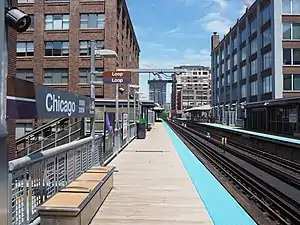Chicago 800N 300W | |||||||||||||||||||||||||||||||||||||||||||||||||||||||||||||||||||||||||||||
|---|---|---|---|---|---|---|---|---|---|---|---|---|---|---|---|---|---|---|---|---|---|---|---|---|---|---|---|---|---|---|---|---|---|---|---|---|---|---|---|---|---|---|---|---|---|---|---|---|---|---|---|---|---|---|---|---|---|---|---|---|---|---|---|---|---|---|---|---|---|---|---|---|---|---|---|---|---|
| Chicago 'L' rapid transit station | |||||||||||||||||||||||||||||||||||||||||||||||||||||||||||||||||||||||||||||
 | |||||||||||||||||||||||||||||||||||||||||||||||||||||||||||||||||||||||||||||
| General information | |||||||||||||||||||||||||||||||||||||||||||||||||||||||||||||||||||||||||||||
| Location | 300 West Chicago Avenue Chicago, Illinois 60610 | ||||||||||||||||||||||||||||||||||||||||||||||||||||||||||||||||||||||||||||
| Coordinates | 41°53′47″N 87°38′09″W / 41.896467°N 87.635833°W | ||||||||||||||||||||||||||||||||||||||||||||||||||||||||||||||||||||||||||||
| Owned by | Chicago Transit Authority | ||||||||||||||||||||||||||||||||||||||||||||||||||||||||||||||||||||||||||||
| Line(s) | North Side Main Line | ||||||||||||||||||||||||||||||||||||||||||||||||||||||||||||||||||||||||||||
| Platforms | 2 Side platforms | ||||||||||||||||||||||||||||||||||||||||||||||||||||||||||||||||||||||||||||
| Tracks | 2 | ||||||||||||||||||||||||||||||||||||||||||||||||||||||||||||||||||||||||||||
| Construction | |||||||||||||||||||||||||||||||||||||||||||||||||||||||||||||||||||||||||||||
| Structure type | Elevated | ||||||||||||||||||||||||||||||||||||||||||||||||||||||||||||||||||||||||||||
| Accessible | Yes | ||||||||||||||||||||||||||||||||||||||||||||||||||||||||||||||||||||||||||||
| History | |||||||||||||||||||||||||||||||||||||||||||||||||||||||||||||||||||||||||||||
| Opened | May 31, 1900[1] | ||||||||||||||||||||||||||||||||||||||||||||||||||||||||||||||||||||||||||||
| Rebuilt | 2006–2008 | ||||||||||||||||||||||||||||||||||||||||||||||||||||||||||||||||||||||||||||
| Passengers | |||||||||||||||||||||||||||||||||||||||||||||||||||||||||||||||||||||||||||||
| 2020 | 666,784[2] | ||||||||||||||||||||||||||||||||||||||||||||||||||||||||||||||||||||||||||||
| Rank | 25 out of 143 | ||||||||||||||||||||||||||||||||||||||||||||||||||||||||||||||||||||||||||||
| Services | |||||||||||||||||||||||||||||||||||||||||||||||||||||||||||||||||||||||||||||
| |||||||||||||||||||||||||||||||||||||||||||||||||||||||||||||||||||||||||||||
| |||||||||||||||||||||||||||||||||||||||||||||||||||||||||||||||||||||||||||||
| |||||||||||||||||||||||||||||||||||||||||||||||||||||||||||||||||||||||||||||
| Location | |||||||||||||||||||||||||||||||||||||||||||||||||||||||||||||||||||||||||||||
Chicago, (Chicago/Franklin in station announcements) is an 'L' station on the CTA's Brown and Purple Lines. Located in the Near North Side neighborhood at 300 W Chicago Avenue at West Chicago Avenue and North Franklin Street in Chicago, Illinois (directional coordinates 800 North, 300 West), the station opened in 1900 as part of the original series of stations on the Northwestern Elevated. A high density of art galleries and several schools is in the vicinity of the station, including the Moody Bible Institute.
Chicago/Franklin serves the Brown Line, but Purple Line Express trains also stop at the station during weekday rush hours.
Station layout
The original station house was on the north side of Chicago Avenue. Beyond the turnstiles were staircases which led up to the two long side platforms. The Chicago platforms were unusually long, starting just north of Chicago Avenue and curving along the track before straightening out just south of Chicago Avenue. Early in the station's history, it not only served 'L' trains but North Shore Line interurbans as well, requiring longer platforms which could berth eight car trains. The number of tracks also decreased from four to two just north of Chicago, meaning the two track, two side platform station had to provide the same capacity as a four track, two island platform station like Belmont (Red/Brown/Purple) or Fullerton. In the decades prior to the Brown Line Capacity Expansion Project, the northern, curved parts of the platforms were blocked off to passenger use; trains stopped south of Chicago Avenue along the straighter portion of the track which was long enough for eight-car trains. There were exit-only turnstiles to Superior Street on the south end of both platforms, along with an auxiliary exit to the south side of Chicago Avenue on the southbound platform.
Chicago/Franklin received major renovations as part of the Brown Line Capacity Expansion Project. The station houses were constructed above street level on the south side of Chicago Avenue alongside each platform. The original, historic station house will be restored and used for support systems. The exits to Superior Street have been rebuilt and reconfigured: each exit now has multiple entrance/exit turnstiles and wider staircases leading down to Superior Street. The canopies were refurbished and moved south, over the operational part of the platform. Additionally, with the installation of elevators at each station house, the station is now accessible to passengers with disabilities.[3]
Bus connections
- 37 Sedgwick (Weekdays Only)
- 66 Chicago (Owl Service)
See also
References
- ↑ "Room for All to Ride". Chicago Daily Tribune. May 30, 1900. p. 12 – via Newspapers.com.

- ↑ "Annual Ridership Report – Calendar Year 2020" (PDF). Chicago Transit Authority, Ridership Analysis and Reporting. January 19, 2021. Retrieved May 31, 2021.
- ↑ "Countdown to a New Brown - Chicago Avenue Station". Chicago Transit Authority. September 21, 2008. Retrieved July 27, 2009.